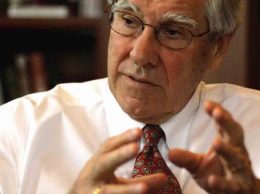Corporate social responsibility on hold when it comes to outrageous drug prices
Imagine you just went to your local pharmacy and were told that the cost of a life-saving drug was $22,500 for 30 tablets to treat AIDS or another infectious disease. Well, if you need the drug Daraprim, that is what you would have to pay.
Turing Pharmaceuticals purchased the right to Darprim this past August and CEO Martin Shkreli decided a price increase of 5500 percent was needed. You heard me right – from $13.50 per pill to $750 per pill. But hope is on the way because San Diego-based Imprimis Pharmaceuticals announced in October that it will be providing an alternative to Darprim that costs a fraction of the pill’s pre-Shkreli price — $99 for a 100-pill supply or about $1 per pill.
In the meantime, how many patients that take Daraprim might get sicker or die because they can’t afford the potential life-saving medication?
A troubling trend comes from a report by Elsevier that out of a research sample of 4,421 drug groups, 222 increased in price by at least 100 percent between November 2013 and November 2014.
One such product is tetracycline, which is commonly prescribed for bacterial infections. It’s per tablet price increased from $0.0345 to $2.3632, a 68-fold increase in one year.
Is the possibility of price controls to blame because drug companies seek to profit before controls are set? Or is it to cash in before the 20-year patent protection expires?
According to an editorial in the Mayo Clinic medical journal, many cancer patients are bankrupted by treatment that costs $120,000 a year. Apparently, cancer drug costs are so high that as many as 20 percent of oncology patients don’t take their medication as prescribed.
In a 2014 survey by Fierce Pharma, a news outlet for the industry, the average pay of the 10 top CEOs of big Pharma was about $30 million. We can blame, at least in part, drug price increases on overpaid CEOs who look to satisfy their own self-interest first and that of their companies, and relegate corporate social responsibility and public health issues to the back of the bus.
To be fair, there is some rationale that high drug prices are needed because the cost of research and development of new, more advanced medications is ever-increasing. With an aging population, the need to fight off diseases that can be life-threatening is acute. Do we really want to cut off the supply of essential medications that might cure cancer?
So, what can be done about the extraordinarily high prices of drugs?
Bernie Sanders wants to make it legal for all Americans to buy drugs from Canada, where they are significantly cheaper. This sounds like a good idea to me as it relies on free market competition to reign in out-of-control drug prices.
Hillary Clinton proposes that there should be a $250-a-month cap on out-of-pocket drug costs for patients with chronic diseases such as cancer. This idea sounds good but it introduces price controls in a roundabout way, which goes against our free market system. Do we really want the government to become involved in another activity given it consistently shows it can’t manage existing ones? Will price controls open the door to more fraud — in Medicare or elsewhere?
Price controls do exist in Europe and Australia because those countries believe that, unlike phones or cars, the unique aspect of drug prices is that if consumers can’t afford the product, they could have worse odds of living or face certain death.
I don’t think anyone has died from not being able to buy an iPhone — at least not yet.
The European argument identifies the humane element and seems to me to be an ethical position to take. But is it fair to drug companies to control prices of a product they developed? Don’t they have a right to set whatever price the market will bear?
There seems to be no easy answer to the growing problem of high drug prices. We can’t expect CEOs to control their own compensation. It rarely occurs that CEOs gain a conscience and look to act in the public interest rather than satisfy their own desires.
Some intervention is required in the best interests of consumers. As with most things, the devil is in the details.
• Steven Mintz is a professor in the Orfalea College of Business at Cal Poly San Luis Obispo.










